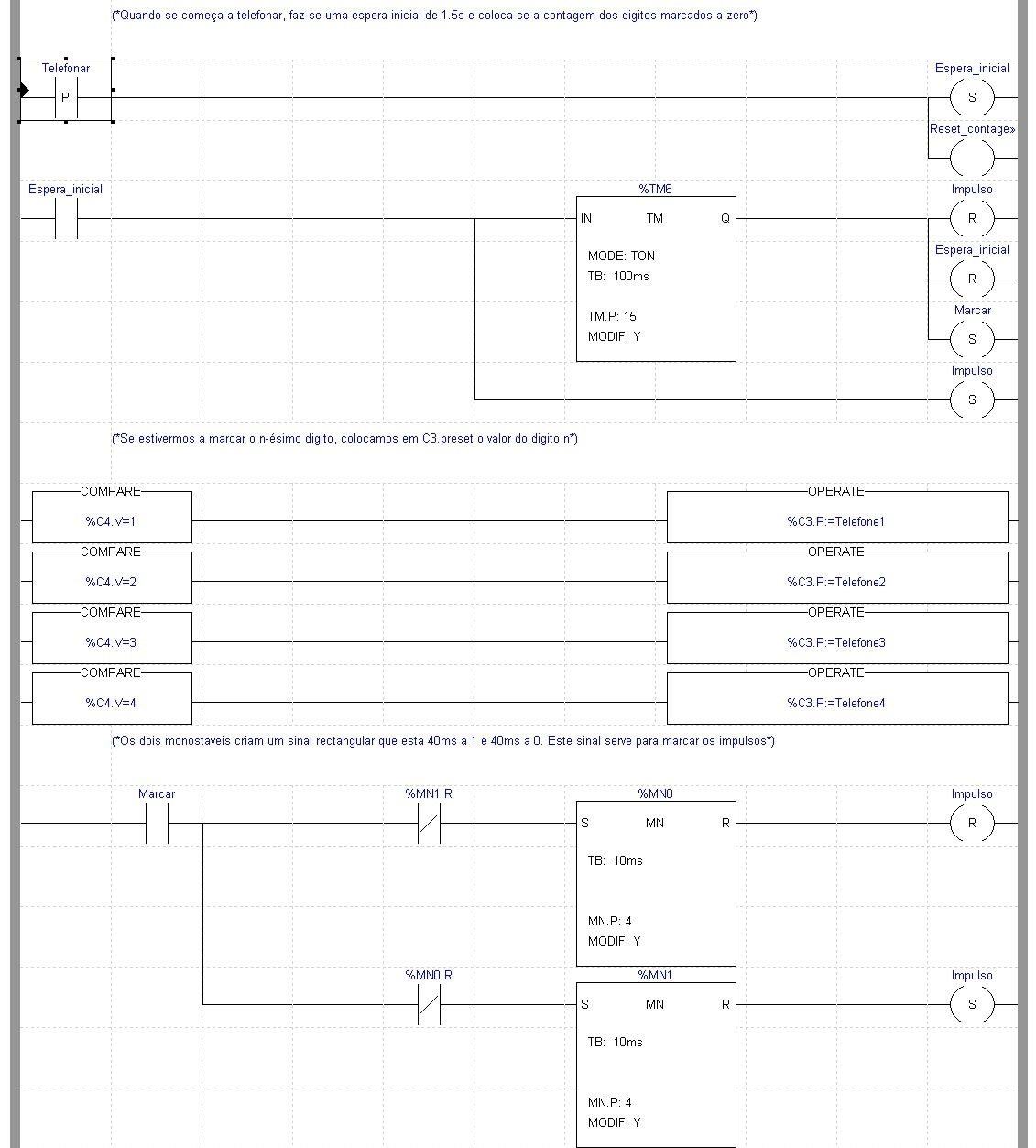POV: ESL programmers
My experience with German programming languages is with Siemens PLC’s, since the programming language changes together with the IDE when you set the language to German. Looking at Structured Text / Instruction List having U (und) instead of A (and) operator and bunch of other things was interesting.
But IIRC there were also higher programming languages that are in other languages? Wasn’t there one for arabic? Was this it: https://github.com/nasser/---/
There’s also Alef, which I thought was the only Arabic programming language 'till now.
The pain is real. Now I wanna design/implement a programming language in the Egyptian dialect (j/k. fuck no)
Maybe that was the one I’ve originally seen. Not sure which one :D
As an Arab, I now want to learn to code in Qalb so I can romantically say that I know the workings of the heart <3
Also, how about we make a programming language called ب and have it just stand for برمجه (“Barmaja”: literally programming in Arabic)
Of course… even an Arabic programming language has a recursive acronym name
Seriously, fuck Excel for this. I always hate to look up function names in German.
Yes, I also hate it!
The Italian version of Excel had the brilliant idea of translating the
MID()function intoSTRINGA.ESTRAI(), which means “extract string”.Seriously, what the fuck.
The localisation of office software functions is atrocious in all languages. They should have defaulted to Volapuk, so that at least we could all suffer together.
It should have been Latin so at least you could feel like a magician or something
I thought of Latin, but then some people actually speak it, so they’d have an unfair advantage.
I would happily pull out my old dictionary and grammar books, for sure!
Wofür steht ‘wd’??? Wochendag oder wie??? GEFEUERT werden muss die Person!
Abor dor Klaus aus Leipzsch saacht das doch so…
Ei fa “Wochedaach” nadierlich. Wie em de Schnawwel gewachst is.
I’ll just leave this here, “An Introduction to German for ABAP/4 Programmer” (SAP):
I am german and I feel physical pain reading this code
Finally, a language where CamelCase feels natural
*KamelKiste
In German you would write “Kamelkiste”, nicht “KamelKiste”. This holds true for most Java class names. I begin to see huge potential for evil …
That was excellent
The ruby on rails generators do this sort of magic. It’s fun while you’re using it, but a nightmare to remember how to use on a 10 year old project.
Ouch.
Oh? You want composit(ion)? Over inheritance maybe?
Yeah, Excel does that, it always fascinated me. It was so weird writing =KDYŽ instead of =IF in Excel. Different times, I guess.
Does that get translated if someone else with a different language opens that file?
No idea, but I would hope so.
Yes, but it would be funny if you could just switch languages in the middle of your sheet, чтобы можно было начать на русском, continue in English,وانتهى باللغة العربية.
Tap for spoiler
I hope that the built in translation in iOS can translate to Arabic well
Don’t worry, the arabic translation is correct
It’s formal Arabic, as is expected of any translator
Internally Excel saves it in English (or some internal code) and translates it when opened.
My company switched from Excel-Interops, where you had to send the German function name to Excel. Now we write .xlsx files directly and have to send the English function name. But when opened it displays all functions in German (or whatever localization Excel is set to).
The best part is that if your version of Excel is German, you can’t write
=IF(). You have to use=FALLS().It’s always fun to google a function and then the translation.
I’m pretty sure it’s not
FALLS()butWENN(), at least the last time I used Excel.
Why is main capitalized but not printf???
If they are trying to follow German rules where nouns are capitalized, I guess this explains why their version of int would be capitalized, but that’s super annoying. Maybe C# is based on this.
And then why is Ganz in caps. I call cap on German C.
Could be because Ganz is short for Ganzzahl and a noun.
So Nat Fibonacci(Nat n) { …} ? Because Ganz would be signed int so Nat should be unsigned int?
I’d suggest “vorzeichnenbehaftete Ganzzahl” (maybe vbGanz) and “vorzeichenlose Ganzzahl” (vlGanz) 🤣 please don’t make that a thing
I know this is a joke but it’s still wild to me that programming languages aren’t localised.
Considering that using a keyword to name anything results in compiler (or worse! Interpreter) errors, and that libraries are a thing. And also that copy-pasting code from the internet is a thing. I don’t think it would be a good idea to localize programming languages.
Industrial controls equipment made by German companies can be programmed in English or German. You can also switch languages (German/English) at any time and the IDE switches over all the keywords.
What are you talking about? That must be some super niche use case, cause most IDEs do not do that. And if they do it’s exclusively used by people who can’t really program.
Lots of the industrial programming languages are very different to “normal”/“proper” programming languages, and I can see them being localised.
For example, this is (PLC programming language) Ladder Logic code:
My dad used that a lot to program Siemens Step5 and Step7 PLCs. I think it was German but names were 8 chars since this was straight from the 80s. When he fixed old machines or updated them with new PLCs he had to do full rewrites a few times because nothing was documented in old school machinery.
If he worked in Germany, did he use English or German mnemonics?
It did depend a little bit, what kind of machine/production line he was working on. Before he retired, he worked for an automation engineering company and had different projects in other EU countries, and tried to be understandable for people in those places. He once even coded some Siemens control panel for an aluminum oven loading robot in the czech republic and tried to translate everything to czech with a dictionary (to have the panel info available in czech,english and German). He did of course speak to the foreman of the workers to get it correct.
The language is entirely in English. Only the comments and values are in Portuguese.
Since ladder is mostly diagram-based it almost doesn’t need to be localized and isn’t jarring when you use non-English variable and function names with English keywords.
Apart from being strictly left-to-right.
If you think it’s jarring to mix names from different languages with English keywords… well, I have bad news for you.
Spacing constraints led to accidental French in “Reset_Contage
m”
You think that about math not being localized too?
There are some local differences in math notation, e.g.
.vs.,as a decimal separator,•vs.×for multiplication,:vs÷for division et cetera.Technically math is localised, especially in places that don’t use the western alphabet.
I guess it would make it way more complicated to use other peoples code if that where the case.
Want to make my job harder? Because that’s how you make my job harder.
The VBA part of the meme is real, VBA is (was?) localized. Turns out it’s a horrible idea: some keywords are badly translated, some are not. Googling localized error messages is useless, so you need to guess the original error message from the translation. Want to copy/paste a function from SO? Not so fast, you need to translate the keywords first! And the variable names as well while you’re at it.
Ironically, you end up spending a lot of time on translation-related issues. I’ve worked on a french-VBA app, and it was a miserable experience (well, even more miserable than english VBA).
Yeah, one time I helped out an HR person with an Excel formula. It took like 5 minutes to write the formula on my laptop. Then I sent it to them and it took another 5 minutes to translate it into the local language…
https://github.com/michidk/rost
Aren’t you müde from writing Rust programs in English? Do you like saying “scheiße” a lot? Would you like to try something different, in an exotic and funny-sounding language? Would you want to bring some German touch to your programs?
rost (German for Rust) is here to save your day, as it allows you to write Rust programs in German, using German keywords, German function names, German idioms.
Too bad that’s based on macros. A full preprocessor could require that all keywords and names in each scope form a prefix code, and then allow us to freely concatenate them.
Bruh why does it feel more natural in German.
I like the branch names auch
PETA isn’t going to like all those
fürloopsFür is short for fuer. The umlauts are tiny “e” on top of the letters
That’s how umlauts historically evolved, but nowadays I wouldn‘t say ü short for ue, but its own letter (even though you still can write it as ue if you don’t have it available on your keyboard or whatever)
Well, my point is that it’s not considered a u, and Austrian and Swiss don’t use it.
Also, fun fact, some romance languages like French and Brazilian Portuguese have an identical diacritic to umlaut but it’s different. It’s meant to mean the vowel is separate (like in the word naïve)
We call it tréma. Aka diaeresis. It explicitly tells you to pronounce two vowels near each other separately.
A typical use is to indicate a normally silent vowel must be read out. For example “maïs” (MA-EE-S’) is completely different from “mais” (MAY).in Brazillian portuguese it had a completely different meaning, and it was used for disambiguation of the pronounciation of some words, in short “gue” in portuguese can make a ghe (gh as in ghost) or a gue (gu as in guatemala), a similiar thing happens with “que”, this umlaug looklike was meant to make clear that the “u” was to be pronounced, so we had spellings like “freqüencia”
A key reason English became the preeminent language of scientific and technical communication, and thus the source of keywords in programming languages, is because German (the other candidate) fell out of favour due to the two world wars. So, were it not for Prussian militarism, our programming languages may have instead been based on German (along with most scientific literature being in German).
Also because, as a person who has studied multiple languages, German is hard and English is Easy with capital E.
No genders for nouns (German has three), no declinations, no conjugations other than “add an s for third person singular”, somewhat permissive grammar…
It has its quirks, and pronunciation is the biggest one, but nowhere near German (or Russian!) declinations, Japanese kanjis, etc.
Out of the wannabe-esperanto languages, English is in my opinion the easiest one, so I’m thankful it’s become the technical Lingua Franca.
Had the world settled on German, someone might be making a similar argument that the world dodged a bullet by choosing a language with phonetic orthography and words composed of logical building blocks rather than a mess like English
Also English is an odd germanic-romance bastard child that Western Europeans tend to like because it has a decent number of cognates for everyone and a simple grammar IF you’re only aiming for simple conversational English. The barrier to entry is quite low, especially if you don’t give a shit about having a thick accent and straight up mispronouncing tricky words (as anyone knows who had a conversation in English with a non-fluent Italian/Spanish/French person).
OTOH German used to be relatively widely spoken in Eastern Europe, and Slavic languages also use declensions AFAIK, and also even post WWII German held quite a bit of momentum in academic circles.
So if the Soviet block had gone the Chinese route and become an economic behemoth instead of withering and dying at the dawn of the Information Age, German being the lingua franca (or at least giving English a run for its money) would have been a distinct possibility IMO.Making fun of people has more “stank” in English (not a hard fact, just my opinion).
* Yiddish has entered the conversation
It’s called java.

























